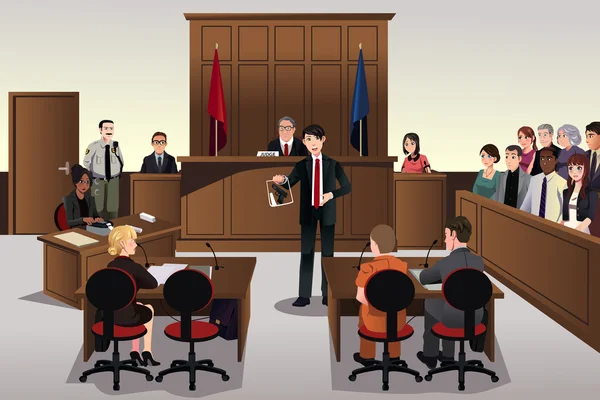
Tribunals continue to play a very important role in today handling over a million cases each year, thus improving the overall efficiency of the justice system. They are responsible for dealing with most disputes between the citizen and the state about the former's right and entitlement.
Tribunals have been defined by Curzon, Dictionary of Law, 1994, p387 as “Bodies outside the hierarchy of the courts with administrative or judicial functions”. This means that while a courts justice is dispense by an independent judiciary, tribunals are
HISTORY
- Length of time in existence. How/ why it came about. What was created because is dispensed,
- Description of Tribunals panels judge etc. what governs it.
- Franks Committee
- Sir Andrew Leggatt
- Advantages
- Disadvantages
- Conclusion
Notes. Administrative tribunals resolve disputes between, for example, the citizen and an officer of a government agency or between individuals in an area of law in which the government has legislated the conduct of their relations.
Origins and history
On 1 November 1955, the British Government appointed a committee under the chairmanship of Sir Oliver Franks to consider and make recommendations on administrative tribunals and inquiries. The report of that committee, published in July 1957, led in due course to the establishment of a permanent standing advisory body called the Council on Tribunals. How did this all come about?
It goes back to the closing years of Winston Churchill’s last administration, when the Government was shaken by a serious scandal, reaching a climax in 1954. In fact, the story really begins in 1938, shortly before the outbreak of war in Western Europe. The Air Ministry was urgently seeking sites for the Royal Air Force to use as airfields and bombing ranges. It acquired a stretch of poor quality chalk downland in Dorset in the south west of England, known as Crichel Down. The Ministry had powers of compulsory purchase. But in the event it did not need to use them as the landowners were prepared to sell. During the war the land became a practice bombing range.
In 1949, after the war was over, the land passed into the hands of the Ministry of Agriculture. A decision was made to put the land to agricultural use. Plans were drawn up to equip the land with a view to farming it as a single unit, in pursuance of the Government’s policy of maximising food production. The land proved to be much more productive than had been thought before the war. One local landowner, whose wife’s family had owned part of Crichel Down before its acquisition by the Air Ministry, wanted to buy it back. Although there was no strict requirement in law, there was an expectation that where land had been acquired under compulsory powers for a particular purpose, and that purpose had come to an end, the land would be offered back for sale to the original owners.
But that did not happen in this case. The land was handed over to the Crown Estate, which negotiated its rental to a farmer of its own choosing. The disappointed landowner complained to his Member of Parliament. Rumours of bribery and corruption within the Ministry began to circulate. The Minister set up an independent inquiry by an eminent senior lawyer. Although the inquiry cleared officials of corruption, it was fiercely critical of the way the matter had been handled within the Ministry. The Minister felt impelled to resign, paying the political price for the misconduct of his officials or so it was seen at the time.
The incident revived pre-war concerns about the extent of ministerial powers and the high-handedness of government officials. It was followed by the establishment of the aforementioned Franks Committee on administrative tribunals and inquiries. But curiously, although the Crichel Down case was widely regarded as a principal reason for the appointment of the committee, it in fact fell outside the committee’s terms of reference. Instead, the committee was asked to look at the working of tribunals and inquiries established under statute for the purposes of Ministers’ functions.
It is worth noting that that nowadays cases like Crichel Down would almost certainly have been the subject of investigation by the Parliamentary Ombudsman, who has power to conduct investigations into allegations of maladministration by government departments leading to injustice to individuals. But back in 1954 there was no Parliamentary Ombudsman. That had to wait till the Parliamentary Commissioner Act of 1967.
The Franks Report proved a turning point in the history of administrative justice in this country. It completely changed perceptions of tribunals. Where they had once tended to be regarded as an extension of the executive arm of government, Franks placed them firmly on the judicial side. The Franks principles of openness, fairness and impartiality became the watchwords for how tribunals ought to operate. Franks gave brief examples of their application:
” Take openness. If these procedures were wholly secret, the basis of confidence and acceptability would be lacking. Next take fairness. If the objector were not allowed to state his case, there would be nothing to stop oppression. Thirdly, there is impartiality. How can a citizen be satisfied unless he feels that those who decide his case come to their decisions with open minds? “
The Council on Tribunals was set up in 1959 to try to ensure that those principles are applied in practice. As of now, there are some 80 or so different tribunal systems under the Council’s oversight.
Origins and history
On 1 November 1955, the British Government appointed a committee under the chairmanship of Sir Oliver Franks to consider and make recommendations on administrative tribunals and inquiries. The report of that committee, published in July 1957, led in due course to the establishment of a permanent standing advisory body called the Council on Tribunals. How did this all come about?
It goes back to the closing years of Winston Churchill’s last administration, when the Government was shaken by a serious scandal, reaching a climax in 1954. In fact, the story really begins in 1938, shortly before the outbreak of war in Western Europe. The Air Ministry was urgently seeking sites for the Royal Air Force to use as airfields and bombing ranges. It acquired a stretch of poor quality chalk downland in Dorset in the south west of England, known as Crichel Down. The Ministry had powers of compulsory purchase. But in the event it did not need to use them as the landowners were prepared to sell. During the war the land became a practice bombing range.
In 1949, after the war was over, the land passed into the hands of the Ministry of Agriculture. A decision was made to put the land to agricultural use. Plans were drawn up to equip the land with a view to farming it as a single unit, in pursuance of the Government’s policy of maximising food production. The land proved to be much more productive than had been thought before the war. One local landowner, whose wife’s family had owned part of Crichel Down before its acquisition by the Air Ministry, wanted to buy it back. Although there was no strict requirement in law, there was an expectation that where land had been acquired under compulsory powers for a particular purpose, and that purpose had come to an end, the land would be offered back for sale to the original owners.
But that did not happen in this case. The land was handed over to the Crown Estate, which negotiated its rental to a farmer of its own choosing. The disappointed landowner complained to his Member of Parliament. Rumours of bribery and corruption within the Ministry began to circulate. The Minister set up an independent inquiry by an eminent senior lawyer. Although the inquiry cleared officials of corruption, it was fiercely critical of the way the matter had been handled within the Ministry. The Minister felt impelled to resign, paying the political price for the misconduct of his officials or so it was seen at the time.
The incident revived pre-war concerns about the extent of ministerial powers and the high-handedness of government officials. It was followed by the establishment of the aforementioned Franks Committee on administrative tribunals and inquiries. But curiously, although the Crichel Down case was widely regarded as a principal reason for the appointment of the committee, it in fact fell outside the committee’s terms of reference. Instead, the committee was asked to look at the working of tribunals and inquiries established under statute for the purposes of Ministers’ functions.
It is worth noting that that nowadays cases like Crichel Down would almost certainly have been the subject of investigation by the Parliamentary Ombudsman, who has power to conduct investigations into allegations of maladministration by government departments leading to injustice to individuals. But back in 1954 there was no Parliamentary Ombudsman. That had to wait till the Parliamentary Commissioner Act of 1967.
The Franks Report proved a turning point in the history of administrative justice in this country. It completely changed perceptions of tribunals. Where they had once tended to be regarded as an extension of the executive arm of government, Franks placed them firmly on the judicial side. The Franks principles of openness, fairness and impartiality became the watchwords for how tribunals ought to operate. Franks gave brief examples of their application:
” Take openness. If these procedures were wholly secret, the basis of confidence and acceptability would be lacking. Next take fairness. If the objector were not allowed to state his case, there would be nothing to stop oppression. Thirdly, there is impartiality. How can a citizen be satisfied unless he feels that those who decide his case come to their decisions with open minds? “
The Council on Tribunals was set up in 1959 to try to ensure that those principles are applied in practice. As of now, there are some 80 or so different tribunal systems under the Council’s oversight.









